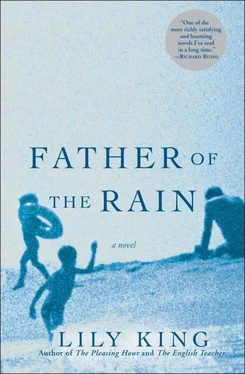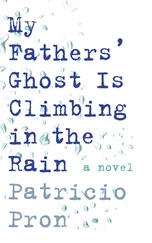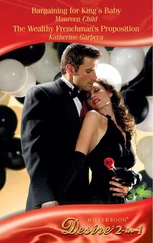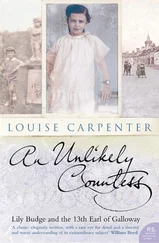Miss Vance and I sit in white latticed iron chairs that press the bare skin of my legs into small cubes. A woman in a white dress and white shoes comes out with a tray and sets it on a glass table nearby. On the tray is a silver teapot, a small pitcher of hot water and an even smaller one of cream, half a lemon wrapped in cloth, three blue teacups, four saucers, and a plate of thin lace cookies.
“Thank you, Heloise,” Miss Vance says, leaning toward the tray. She makes the nut-cracking noise again and Major comes to her side. Onto the extra saucer she pours tea up to the rim and sets a lace cookie to float on top. She nestles the saucer in the grass by her foot while Major sits watching. Another crack and Major bends down to eat and drink.
“There you are,” she says, without looking at the woman approaching in the grass.
This is the shorter, rounder one, the one who always wears a blue wool coat in winter, the one I thought was her sister.
“You’ll have to pull over a chair, Mother.”
I jump out of my seat. “Please, sit here. I’m happy on the grass.”
The woman waves me off, heading toward another cluster of chairs. I don’t notice the garden until the old woman walks into it. It’s a wilder, more chaotic garden than my mother’s, the stone pathways overgrown, the flowers tall and frizzy. There are tufts of long tangled beach grasses, wildflowers, and even a few miniature trees in no particular design. She moves slowly; both her legs are wrapped in bandages. She pulls out a thin green chair from the chaos, and as she sets it down she knocks the tray slightly and mutters something that sounds awfully like, “Sorry, Father,” under her breath.
I stare at her face. Its flesh is soft and powdery, but no more lined or weathered than the other Miss Vance’s. They couldn’t be more than a few years apart in age. They fuss about the tea together, asking me how I take it — strong, weak, or in between; milk, lemon, lump sugar, or sifted — and then argue pleasantly about the amounts put in and their effects on the hue of the tea. “It’s too pale now!” “It’s just right, just right for me,” the plumper Miss Vance reassures her.
I feel like a character who has stumbled into another world where things are slightly creepy but also beautiful and soothing. The tall flowers in the garden cast long shadows on the grass and everything that is not shadow is gold in the low late-afternoon sun. If they asked me to stay the night, I would.
After he’s finished a second saucer of tea and cookie, Major lays his head in tall Miss Vance’s lap. She bends her head over the dog and strokes him for a long time, then she straightens up to look at me. “I understand if you want to take him back.” She begins the sentence loudly but finishes in a tremble.
“Oh, no. Oh, no.” I shake my head furiously. “I just wanted to visit, to make sure he was really here. I wasn’t very attached to him.”
“Oh,” she says sadly.
“I’d only had him for a few days. I knew even when we got him that I was going to be leaving, but my father didn’t.”
“That sounds like an awfully big secret for one little girl to carry around.”
I’m careful not to nod. I don’t want them to think I feel sorry for myself or anything, which is what Garvey always teases me about. Is widdew Daywie feewing oh so sowwy fo’ hewsewf again? My throat aches, and I wonder if I’m coming down with something.
A warm hand clutches mine. “Father, I think a game of Parcheesi would do us all a world of good.”
On Saturday my father and Mrs. Tabor have friends over for lunch. Some of the guests are old friends of my father’s, people I’ve seen in our living room for years, and some are Mrs. Tabor’s friends, a few married couples and a lot of divorcées like her. The two groups don’t mingle much. Mrs. Tabor is younger than my father; her male friends look like they come from Garvey’s generation with their shoulder-length hair and thick sideburns, and the women wear looser clothes in bolder colors than the wives of my father’s friends in their stiff pastel dresses.
Patrick and I mix the Bloody Marys at a table we’ve set up on the lawn. Elyse turned five this week and rides her new red bike with training wheels around the edge of the pool. By three, no one has had lunch and the adult faces are red and screaming at each other. At least that’s what it sounds like to me.
“What do you mean you’re giving up paddle! Gil, did you hear this?”
“Did I hear what?”
“Your wife. She’s giving up paddle this winter to volunteer at the loony bin.”
“Precisely where she belongs!”
Mr. Porters goes running into the poolhouse and comes out with an umbrella. Then he leaps off the diving board in his clothes, the umbrella open above him like Mary Poppins.
Everyone screams and hoots. A man I don’t know jumps in with a set of golf clubs. More shouting. Wives towel off the clubs and the leather bag and spread everything on the grass to dry. The sun slips down farther and they switch to gin-and-tonics and martinis. Mrs. Tabor sends me inside to make up a platter of cheese and crackers, and Patrick is sent downtown on his bike for more ice. When I come out, I see Elyse ride her new bike straight into the pool. I drop the platter on the grass and run.
“Elyse went in the pool!” I scream, but my voice is swallowed by the boom of the adults’ talk.
I dive in. She’s still on the bike at the bottom, tilted toward the drain. I grab her, expecting her to come free easily. But she’s clutching the handlebars, and though everything is lighter underwater I can’t lift the two at once. I tug at her hard but she’s so stubborn, even underwater, even when she doesn’t know how to swim, and will not let go of her new bicycle. Then the water shudders with a muffled crash and the man who jumped in with the golf clubs is lifting me, Elyse, and her bike to the surface.
Elyse doesn’t need CPR. Her lips are blue, but her face is bright red and she comes up hollering about her bike being wet and ruined.
“Let me take you to your mommy,” the man says to her once we’re all out and dripping on the cement. Mrs. Tabor has her back to the pool, waving an arm in the air, shouting out a story.
“I don’t want my mommy. I want to dry off my goddamn bike!”
I can’t catch my breath but I look at him gratefully and he touches the top of my head before he drips off and blends back in with the crowd.
Sunday is quieter. By noon it has begun to rain. Mallory comes over and we make prank calls in the kitchen. Patrick is really good at voices.
“Is John Wall there?” he asks, becoming a man calling on business. “Then is his wife Susie there?” He smiles at us, then takes the smile right out of his voice when he speaks again. “Well, aren’t there any Walls there?” He tilts the phone away from his ear and we can hear the lady saying no. Patrick switches back to his regular kid voice. “Then what’s holding up your house, lady?”
We always save the best for last. Patrick gets out his stop watch and we each pick a number in the phone book. The minute the person answers, the timing starts. The goal is to keep your person on the line as long as possible. My trick is to always go for the old-sounding names, Lillian or Evelyn or Elijah. Old people are much more trusting and have time to talk. My record is twenty-five minutes. No one has been able to touch it.
Today Mallory goes first. She pretends to be a little girl who burnt herself. “It hurts,” she says. “Mommy isn’t here. She ran away. With the garbageman.” Patrick and I are dying. “They live at the dump now. I don’t like to visit.” And then she slams the phone down fast. “He said he was going to call the police.”
Читать дальше












